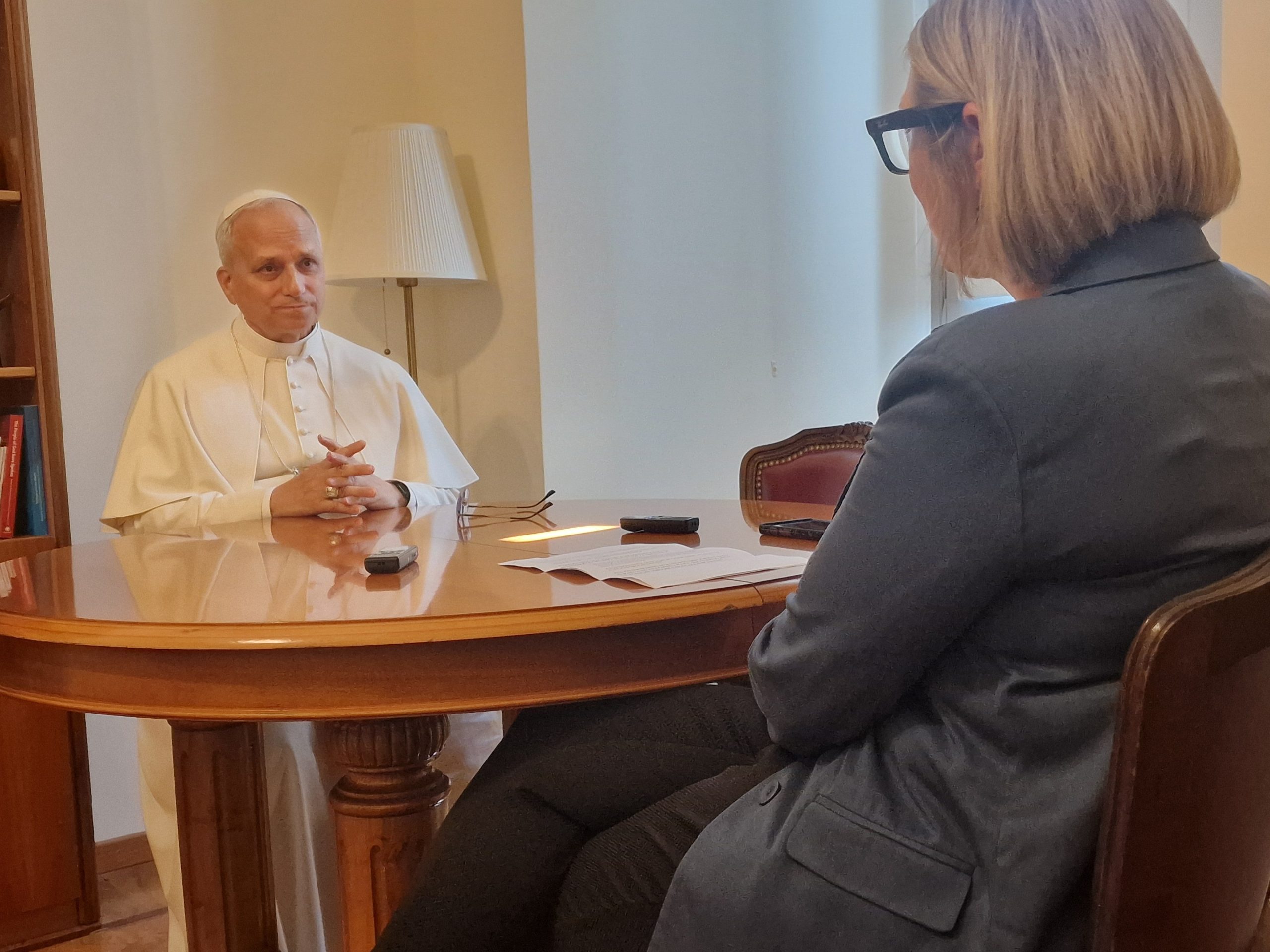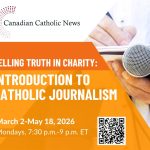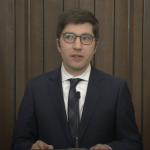ROME (CNS) — Humanity has the potential to overcome the violence and hatred that is increasingly dividing people, Pope Leo XIV said in an excerpt from his first interview as pope.
“I think it’s very important to start a deeper reflection, of trying to figure out: Why is the world so polarized? What’s going on?” he said, pointing to several different “elements that have led to this,” including the “crisis of 2020” because of the COVID-19 pandemic, the ever-widening earnings gap between the working class and the wealthy as well as the loss of a sense of what life is really about.
“The news that Elon Musk is going to be the first trillionaire in the world. … What does that mean, and what’s that about? If that is the only thing that has value anymore, then we’re in big trouble,” he said.
A series of excerpts was published Sept. 14, the pope’s 70th birthday, by the Catholic online news outlet, Crux, ahead of the Sept. 18 publication of the book, “Leo XIV: Citizen of the World, Missionary of the XXI Century,” in Spanish by Penguin Peru. English and Portuguese editions of the book will be released in early 2026.
The book includes two separate interviews totaling about three hours of conversation in July between Pope Leo and Elise Allen, Crux’s senior correspondent. The excerpts included topics such as the pope’s favorite sports teams, how he was settling into his role as pope, the war in Ukraine, synodality and the increasing polarization in the world.
Asked about how he is adapting to being the pope after his election May 8, he said, “There’s still a huge learning curve ahead of me.”
The pastoral part has not been difficult, he said, “although I’m surprised at the response, how great it continues to be.”
A world leader confronting polarization
What is totally new, he said, “is being thrown onto the level of world leader. It’s very public; people know the phone conversations or meetings I’ve had with the heads of state of a number of different governments, countries around the world, in a time when the voice of the church has a significant role to play.”
Pope Leo told Allen, “We live in times when ‘polarization’ seems to be one of the words of the day, but it’s not helping anybody. Or if it’s helping anyone, it’s very few when everyone else is suffering.”
“We have to continue to remind ourselves of the potential that humanity has to overcome the violence and the hatred that is just dividing us more and more,” he said.
When asked how polarization can be resolved, the pope said people need to reflect on and talk about what led to the divisions.
“I don’t pretend to have all the answers,” he said, but “perhaps in some places the loss of a higher sense of what human life is about” is the root of the problem, because if people lose the sense of the values of human life, the family and society, then “what matters anymore?”
Other factors contribute, too, he said, but “one which I think is very significant is the continuously wider gap between the income levels of the working class and the money that the wealthiest receive.”
“For example, CEOs that 60 years ago might have been making four to six times more than what the workers are receiving, the last figure I saw it’s 600 times more than what average workers are receiving,” he said, commenting then on news that a proposed compensation package from Tesla could make its CEO, Musk, become the world’s first trillionaire.
Pope says synodality could be ‘antidote’ to problems in world, and church
Synodality could be a sort of antidote to polarization by being “a way of addressing some of the greatest challenges that we have in the world today,” he added.
“If we listen to the Gospel, and if we reflect upon it together, and if we strive to walk forward together, listening to one another, trying to discover what God is saying to us today, there is a lot to be gained for us there,” he said.
Pope Leo emphasized that synodality, a hallmark of Pope Francis’ pontificate, began much earlier, starting with the Second Vatican Council and developing “at least in Latin America,” where the U.S.-born pope served for more than 20 years.
The idea is “not to try and transform the church into some kind of democratic government, which, if we look at many countries around the world today, democracy is not necessarily a perfect solution to everything,” he said.
“But respecting, understanding the life of the church for what it is and saying, ‘We have to do this together.’ I think that offers a great opportunity to the church and offers an opportunity for the church to engage with the rest of the world,” he said.
Asked to describe how he understands synodality, Pope Leo said it “is a way of describing how we can come together and be a community and seek communion as a church, so that it’s a church whose primary focus is not on an institutional hierarchy, but rather on a sense of ‘we together,’ ‘our church,’” where everyone has a specific vocation, “a role to play and something to contribute, and together we look for the way to grow and walk together as church.”
Pope Leo said he knows “some people have felt threatened by that.”
“Sometimes bishops or priests might feel, ‘synodality is going to take away my authority.’ That’s not what synodality is about, and maybe your idea of what your authority is, is somewhat out of focus, mistaken,” he said.
Nonetheless, he said, synodality is “an attitude which I think can teach a lot to the world today.”
Building bridges to peace through dialogue
When asked about the potential of the Vatican being a mediator in the current conflict in Ukraine, Pope Leo said, “I’d make a distinction in terms of the voice of the Holy See in advocating for peace and a role as mediator, which I think is very different and is not as realistic” as “raising my voice, the voice of Christians, and the people of goodwill, saying that peace is the only answer.”
“The useless killing after these years of people on both sides — in that particular conflict, but in other conflicts — I think people have to somehow be wakened up to say, there’s another way to do this,” he said.
“I believe strongly that we cannot give up hope, ever. I have high hopes in human nature,” he said.
“There are bad actors, there are the temptations. On any side of any position, you can find motivations that are good and motivations that are not so good. And yet, to continue to encourage people to look at the higher values, the real values, that makes a difference,” he said. “You keep trying to push and say to people, let’s do this in a different way.”
The idea of working toward peace by building bridges, he said, is done “primarily through dialogue.”
“In theory, the United Nations should be the place where many of these issues are dealt with,” he said. “Unfortunately, it seems to be generally recognized that the United Nations, at least at this moment in time, has lost its ability to bring people together on multilateral issues.”
He said he is learning about the Holy See’s longstanding role in diplomacy, but “those things are all new to me in any sense of hands-on.”
“I’ve followed current affairs for many, many years,” he said, “but the role of pope is certainly new to me. I’m learning a lot and feeling very challenged but not overwhelmed. On that one I had to jump in on the deep end of the pool very quickly.”
However, he said, the most important part of being pope is to confirm others in their faith, which “is also something that can happen only by the grace of God.”
“The Holy Spirit is the only way to explain how did I get elected to this office, to this ministry? Because of my faith, because of what I have lived, because my understanding of Jesus Christ and the Gospel, I said, ‘Yes, I’m here,’” he said.
Both American and Peruvian as pope
Being the first pope from the United States and the second pope who served for decades in Latin America, “which of those do you identify with more?” Allen asked.
“I think the answer is both/and. I’m obviously an American and I very much feel that I’m an American, but I also love Peru very much, the Peruvian people, that is a part of who I am,” he said.
“Half of my ministerial life was spent in Peru, so the Latin American perspective is very valuable to me,” he said.
Asked about his loyalties when it comes to sports teams, specifically whom he would cheer for if the United States were to face off against Peru in the World Cup, the pope responded, “Probably Peru,” just because of the ties he had there.
When it comes to baseball, he said, “Robert Prevost was a White Sox fan, but as pope, I’m a fan of all the teams.”
That approach has come easy because at home, “I grew up a White Sox fan, but my mother was a Cubs fan, so you couldn’t be one of those fans that shut out the other side,” he said. “We learned, even in sports, to have an open, dialogical, friendly and not angry competitive stance on things like that, because we might not have gotten dinner had we been!”




